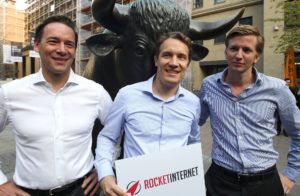Rocket is falling down to Earth

German incubator’s quest to dominate internet businesses outside of China and US ignores the realities of emerging markets
Rocket Internet (Rocket), the German startup factory, takes business models of successful internet companies operating in one part of the world and replicates them in new geographies. With a market cap of ~EUR4bn and over 30,000 employees in 100+ countries, one could count it as an example of a company successfully reaping the benefits of digital technology [/economy]. Rocket’s business model focuses on the implementation of go-to-market strategies in developing economies entering the “internet era” and utilizes data and analytics to create scalable and capital efficient ventures. Many investors have viewed it as a way to enter new markets across the globe – Africa, Latin America and Southeast Asia, characterized by rising incomes and internet / smartphone penetration. [1] Doesn’t this sound great?

Let’s not go so fast. The assumption that every emerging economy would follow the internet revolution seen in China is extremely bullish and the path to profitability of Rocket ventures has so far proved to be much longer than the company and its investors have anticipated. As such, what appears to be a great business model on paper, requires astronomical investments to cover Rocket’s multiple ventures’ cash burns. I have significant doubts about the sustainability of Rocket’s business and believe it will, sooner or later, join the list of losers of digital technology [/economy].
Business model…
In its Investor Report, Rocket identifies 3 core competencies of the business model to be [2]:
- Scalability – identifying proven venture-level business models that can be quickly replicable
- Capital efficiency – limited up-front capital requirements to test the viability of ventures’ business models
- Low risk – use of successful existing business models and launching them in the geographies with limited direct competition
…and the actual picture
Let’s look more closely at each of these components [3]:
1. Scalability
Rocket has developed proprietary technology that give its ventures ready-made solutions to launch and scale online businesses.
- Technical infrastructure – A core platform exists for each of three core sectors (ecommerce, market place and e-finance) that enables fast roll-out and scale of the business.
- Analytical excellence – Standardized reporting and analytical tools are used to measure performance of the ventures and help them benchmark against each other.
While proprietary technology eases up the set up of Rocket’s ventures, significant infrastructure investments are needed once ventures pass the initial stage of growth. One-model-fits-all infrastructure approach leads to lack of customization and adaptability to the particular venture’s business model and geography it is operating in. For example, data warehouse requirements for a fashion retailer are significantly different from those of a multiple – verticals ecommerce platform. At the launch of the venture, simple and inexpensive unified solution might work well for both players, but once the venture has achieved significant scale, it becomes extremely costly and difficult to migrate to the customized solution. Similarly, open source analytics options and tracking of data (ie. Google analytics) are a cheap and easily-adoptable solution for small and unproven ventures, but can become an expensive legacy to have once the business scales and runs into data security issues and concerns over granularity of data collected.
2. Capital efficiency
- Knowledge sharing – there is ongoing knowledge transfer among the ventures in Rocket portfolio. Best practice sharing minimizes the start-up time, costs and improves efficiency.
- Synergies – Rocket leverages synergies across the network by negotiating contracts on behalf of numerous ventures to gain advantages of scale, sharing best practices and know-how.
- Partnerships – Rocket is leveraging its size and reputation to secure competitive contracts with technology / marketing solutions providers such as Google, Facebook, Salesforce, Qlikview, etc.
While knowledge sharing among Rocket ventures improves efficiency at the launch / initial growth stages of the ventures, it is no longer relevant once ventures grow and become increasingly specialized in their respective domain and geography. The power of synergies also diminishes as employees of various Rocket ventures begin to protect their interests and become focused on the particular venture they are building, rather than Rocket portfolio as a whole. In many of the emerging markets where Rocket ventures operate, the lack of infrastructure, low credit card penetration rates and slower than anticipated internet adoption represent significant barriers to the growth of the business and require astronomical levels of investment from the side of ventures. Often as first movers in the market, Rocket ventures invest to improve the underlying conditions for growth which other players in the market subsequently have access to and can benefit from without spending any of their own funds. This decreases the barriers to entry and invites other players to compete in these underserved markets.
3. Low risk
- Portfolio pipeline – Launching several new ventures per year, Rocket secures consistent pipeline of opportunities and diversifies risks of an individual venture’s failure to succeed.
Rocket’s ventures face similar market conditions and risks. Large portfolio pipeline therefore doesn’t diversify the risk but rather increases it.
Future
Although Rocket has several successful exits (CityDeal, Zalando, HelloFresh, etc), penetration of internet-based business in emerging markets requires significant investments in infrastructure and customer education. What is more, learning-by-doing model often leads to costly mistakes and failed attempts to enter the market. Rocket ventures are often closing months after the lunch and the vast majority (if not all) are highly unprofitable even after several years into their operations. With the increasingly more crowded competitive landscape and lowering costs of technology and technical expertise, I do not believe in sustainability of Rocket’s business model and think it’s just a matter of time before they pivot their core strategy.
[1] https://www.ft.com/content/50efb818-16cd-11e6-b197-a4af20d5575e
[2] https://www.rocket-internet.com/investors/financial-information
[3] https://www.bloomberg.com/news/articles/2016-05-31/rocket-internet-narrows-quarterly-losses-at-portfolio-startups
[4] https://www.wsj.com/articles/rocket-internet-announces-ipo-price-range-1411495382
[5] http://www.reuters.com/article/us-rocket-internet-stocks-idUSKCN0XP1TW





Great Post Katarina. I have worked for Rocket-Internet in the summer on 2012 in Malaysia. I was impressed by their ability to execute very well and very fast on proven business models. One question that comes to my mind as I think about their business model is to what extend is their culture beneficial to their business model. Rocket is known for a very agressive work culture, with a lot of confrontation and sometimes volatile decisions. I wonder wether this model, while it works in the short-term, is a good way to attract and keep good talent in the long term?